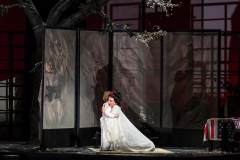Madama Butterfly
Mo | Tu | We | Th | Fr | Sa | Su |
MADAMA BUTTERFLY – concert performance
Opera in three acts, in Italian with Hungarian, English, and Italian subtitles
ACT I
On a hill overlooking Nagasaki harbour, U. S. Navy Lieutenant Benjamin Franklin Pinkerton inspects a Japanese house with Goro, a sharp local marriage broker who has arranged for him to have it when he marries Cio-Cio-San. Pinkerton meets Suzuki, who has been hired as the bride's chambermaid. Consul Sharpless is the first to arrive for the ceremony. The carefree Pinkerton explains to him that he has signed a 999-year marriage contract, which he can cancel any time he likes. Sharpless feels concern for the Japanese girl, who may take her vows more seriously. The bridal party is approaching, headed by Cio-Cio-San. She greets Pinkerton and the consul and she tells the latter about her background: the family having lost its money, she became a geisha, which she points out is a respectable profession. She turns out to be fifteen years old. When Pinkerton asks Butterfly what she is carrying in her full sleeves, she shows toilet articles, then a sheathed knife, which she does not want to discuss. Goro explains that her father committed hara-kiri on orders from the emperor. The girl tells Pinkerton she visited the consulate to see about adopting his religion. The Commissioner reads the marriage contract, which the parties sign. The party is interrupted by an uncle of Cio-Cio-San's, a bonze, who has found out about her conversion and stirs up the others to denounce her. Pinkerton comforts CioCio-San, who calls Suzuki to help her change into her bridal nightgown. As evening falls, Pinkerton speaks lovingly to his bride, and they embrace before entering the house.
ACT II
Three years later in the same house Butterfly is waiting patiently for her husband's return. Suzuki doubts that Pinkerton will come back as he had promised, "when the robins build their nests". Goro appears with Sharpless, who tells Butterfly that Pinkerton has written him, asking him to seek her out. Butterfly is overjoyed. Goro now introduces a suitor, Prince Yamadori, whom she haughtily informs that she is already married. Goro, Yamadori and Sharpless share the information that Pinkerton's ship will soon arrive but he does not want to see Butterfly. Sharpless interrupts reading out the letter to ask Butterfly what she would do if her husband never returned. She could go back to be a geisha, she says - or, better, die. Sharpless advises her to marry Yamadori, at which the indignant Butterfly introduces her son, saying that Pinkerton will surely come when he knows about him. Sharpless leaves without delivering his entire message. A cannon shot is heard; Butterfly recognizes the ship in the harbour as Pinkerton's. Beside herself with joy, she makes Suzuki join her in gathering flowers and strewing them around the house. Once more she has Suzuki bring her bridal gown. The two women and the child sit watching for Pinkerton's return.
ACT III
The exhausted Butterfly goes to her room to sleep for a while with Suzuki's promise to wake her when Pinkerton comes. Scarcely has she gone when Pinkerton arrives accompanied by Sharpless, telling Suzuki not to wake Butterfly Suzuki spots a woman in the garden. Pinkerton's "real American wife". The two men want Suzuki's help in persuading Butterfly to relinquish the child. Distressed by the house full of memories, Pinkerton asks Sharpless to do whatever is necessary for Butterfly and leaves. His wife Kate comes in with Suzuki. Butterfly returns wondering where Pinkerton may be, quickly guessing that Kate is his wife. She says Pinkerton can take his son if he will come for him in person. When the visitors have gone, she takes her father's dagger and is about to stab herself when the child runs in unexpectedly. She embraces him in an impassioned farewell and sends him to play with an American flag. She kills herself with the knife behind a screen. Dragging herself back to embrace her son, she dies as the distraught Pinkerton, Galling her name, returns with Sharpless.
Program and cast
Librettist
Giuseppe GiacosaLuigi Illica
Conductor: István Dénes
Cio-Cio-San: Kinga Kriszta
Suzuki: Lusine Sahakyan
Kate: Nánási Helga
Pinkerton: Gergely Boncsér
Sharpless: Csaba Szegedi
Goro: János Szerekován
Yamadori: Barna Bartos
The Bonze: András Kiss
The Imperial Commissioner: Máté Fülep
Featuring the Hungarian State Opera Orchestra and Chorus
Hungarian State Opera
STANDING ROOM TICKETS - INFORMATION IN CASE OF A FULL HOUSE!
If all the seats are sold out for the selected time, but you still want to see the production on that day, 84 of the extremely affordable standing seats will be sold at the theatre, 2 hours before the start of the performance, with which you can visit the gallery on the 3rd floor. Tickets can be purchased at the ticket office of the Budapest Opera House. We would like to draw your attention to the fact that the stage can only be seen to a limited extent from the standing places and the side seats, but at the same time, following the performance is also supported by television broadcasting on the spot.
The Opera House is not only one of the most significant art relic of Budapest, but the symbol of the Hungarian operatic tradition of more than three hundred years as well. The long-awaited moment in Hungarian opera life arrived on September 27, 1884, when, in the presence of Franz Joseph I. the Opera House was opened amid great pomp and ceremony. The event, however, erupted into a small scandal - the curious crowd broke into the entrance hall and overran the security guards in order to catch a glimpse of the splendid Palace on Sugar út. Designed by Mikós Ybl, a major figure of 19th century Hungarian architecture, the construction lived up to the highest expectations. Ornamentation included paintings and sculptures by leading figures of Hungarian art of the time: Károly Lotz, Bertalan Székely, Mór Than and Alajos Stróbl. The great bronze chandelier from Mainz and the stage machinery moda by the Asphaleia company of Vienna were both considered as cutting-edge technology at that time.
Many important artists were guests here including Gustav Mahler, the composer who was director in Budapest from 1887 to 1891. He founded the international prestige of the institution, performing Wagner operas as well as Magcagni’ Cavalleria Rusticana. The Hungarian State Opera has always maintained high professional standards, inviting international stars like Renée Fleming, Cecilia Bartoli, Monserrat Caballé, Placido Domingo, Luciano Pavarotti, José Cura, Thomas Hampson and Juan Diego Flórez to perform on its stage. The Hungarian cast include outstanding and renowed artists like Éva Marton, Ilona Tokody, Andrea Rost, Dénes Gulyás, Attila Fekete and Gábor Bretz.

 EN
EN DE
DE IT
IT FR
FR ES
ES RU
RU JP
JP RO
RO
 Seating plan
Seating plan 


